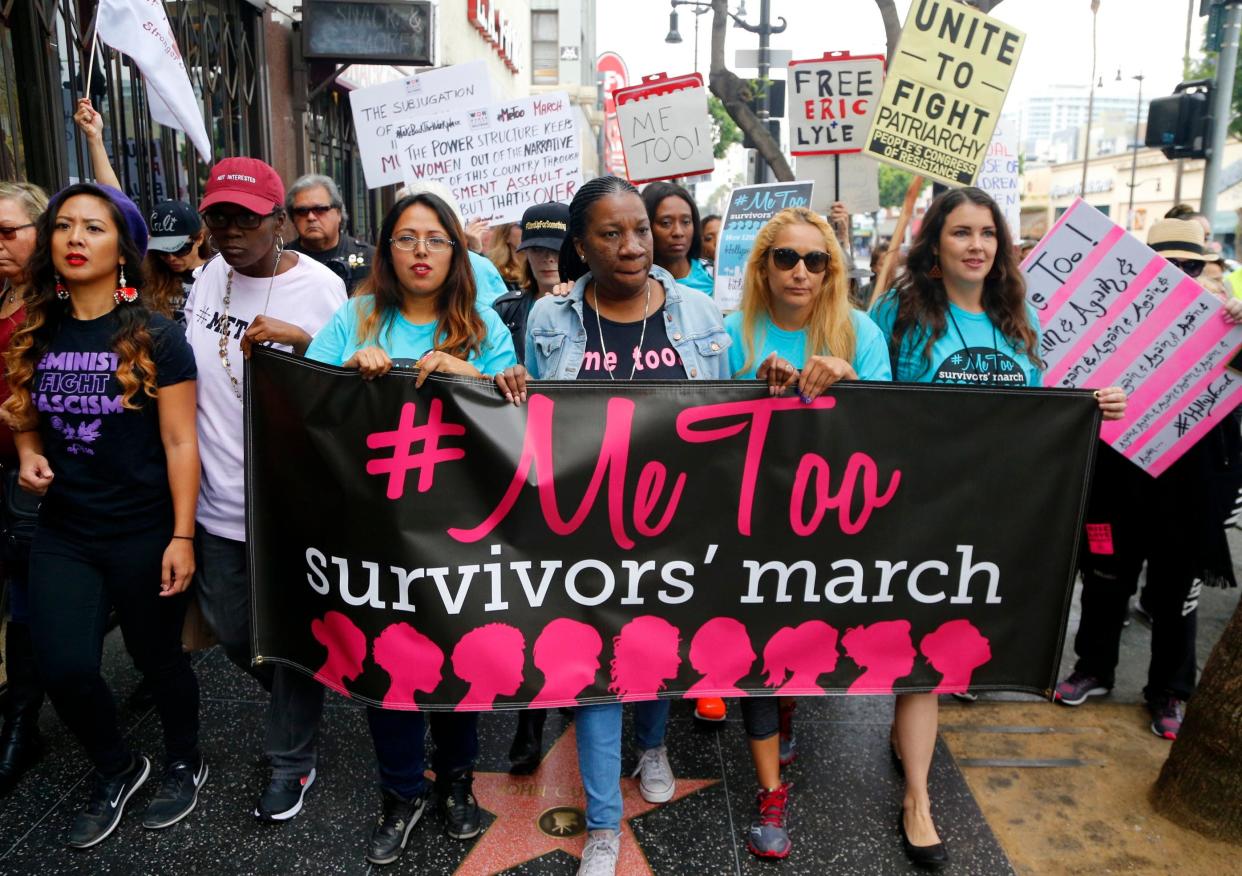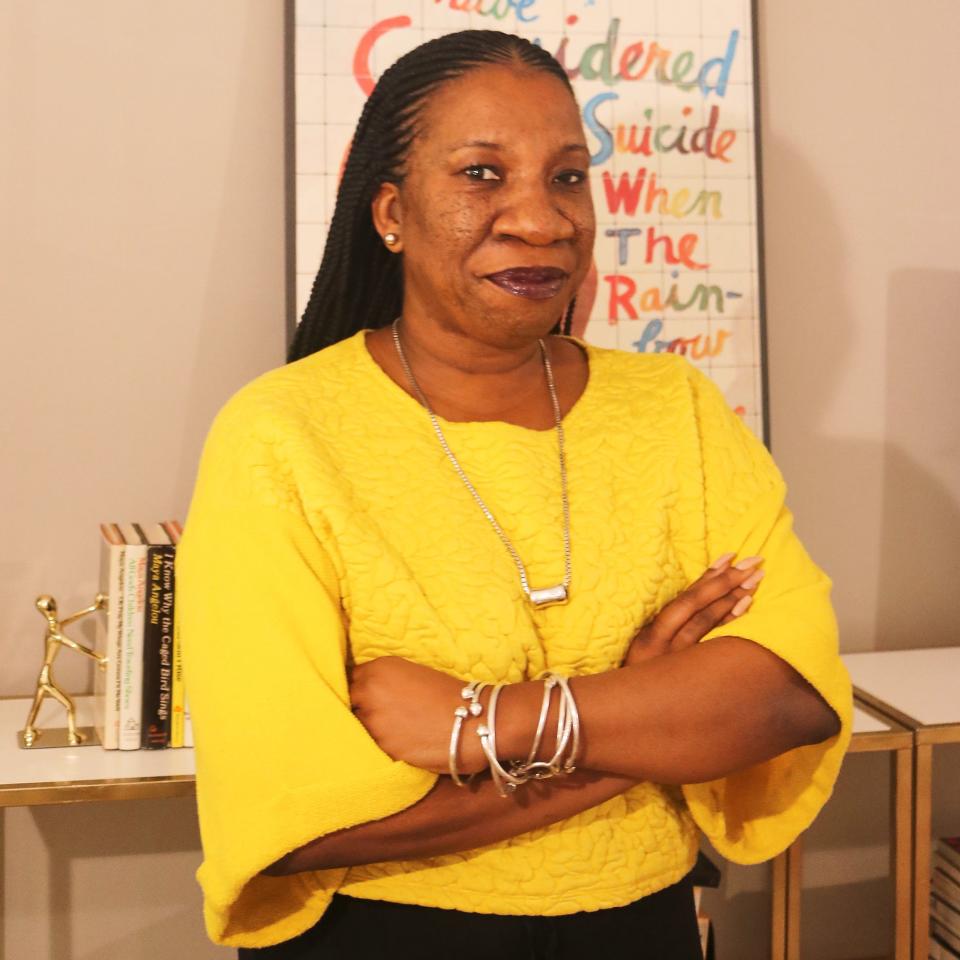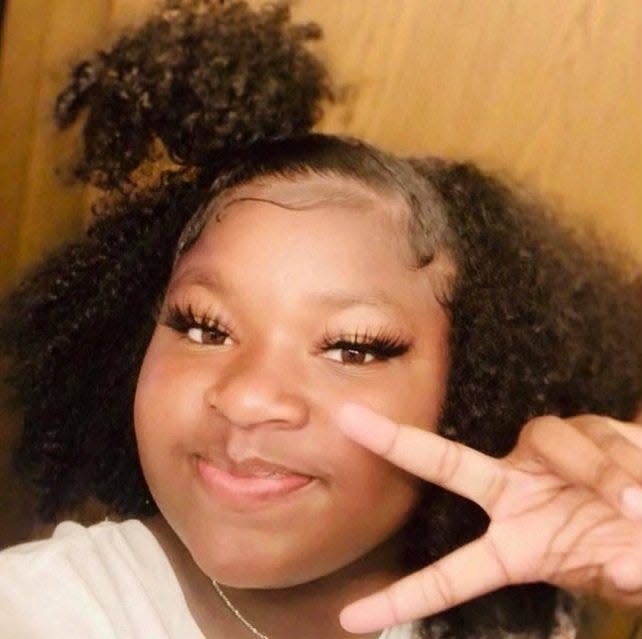Tarana Burke talks future of 'me too' movement ahead of Women's Fund of Central Ohio event

- Oops!Something went wrong.Please try again later.
When the #metoo hashtag went viral in 2017, activist and author Tarana Burke saw a great opportunity to bring national attention to the pervasiveness of sexual violence.
What she didn’t consider was the impending backlash.
“People kept saying, ‘Well, you know the backlash is coming, don’t get too comfortable,’” said Burke, a native of the Bronx in New York CIty, who started using the “me too” phrase in 2006 as part of her work connecting and empowering survivors of sexual assault. “In my naiveté, I (said), ‘What could the backlash be to saying we demand consent, we want to stop rape?’”
The backlash includes people complaining that “cancel culture has gone too far,” looking for any reason to call survivors liars, and lamenting the lack of “due process” of law — without clear understanding of the principle, Burke said.
More on #MeToo movement: Columbus advocates say #MeToo changed awareness of sexual assault
It also includes inadequate funding for sexual violence prevention and even the “good guys” not wanting to talk about it, she added.
“It makes people uncomfortable,” she said. “Even folks who haven't committed any kind of harm — because they can't sit in their own discomfort with just how pervasive and how insidious this is, they'd rather not deal with it.”
Tarana Burke coming to Columbus
It’s Burke’s mission to keep talking about it, which she will do in Columbus on Wednesday, April 26, as the featured speaker at the Women’s Fund of Central Ohio’s Keyholder fundraiser. The annual event, which begins at 6:30 p.m. at Mershon Auditorium at the Wexner Center for the Arts, raises money to support grantmaking, research and advocacy that benefits women and girls. Tickets can be purchased at womensfundcentralohio.org/keyholder.
It's fitting that Burke’s appearance will happen during Sexual Assault Awareness Month. Through her nonprofit, me too. International, she is leading a survivor-focused, global movement committed to healing, political organizing, fundraising and more.
The origin of 'me too'
A survivor herself, Burke has said a catalyst of her advocacy was meeting a young Black girl who shared her story of abuse, which prompted Burke to confront her own experience and support Black and brown girls who were survivors of sexual assault.
Years later, Burke’s “me too” phrase took over social media after actress Alyssa Milano used it as a hashtag in a tweet.
Pretty soon, an avalanche of posts from women all over the world descended upon social media.
After addressing valid concerns that her work had been co-opted, Burke wrote in her book "Unbound" that seeing women come forward gave her even more conviction in her advocacy.
Soon after, the “me too” movement included women speaking out against film producer and convicted sex offender Harvey Weinstein and other famous men accused of abuse.
“I think it's important for people to remember that most survivors of sexual violence don't see justice through the legal system,” Burke said. “And so, some of the cases that we saw elevated into the media … the reason why they were celebrated is because it's so surprising to see any type of accountability on any level when it comes to sexual violence.”
But that's not the extent of the movement's impact.
“I think we also have to look at the way in which people talk about sexual violence now — the way in which we have this opening for survivors to express the things that they've been holding for all of these years,” Burke said.

'The backlash is rooted deeply in fear'
Despite that progression, there have been prominent naysayers of the movement, including former President Donald Trump, who said, “It is a very scary time for young men in America.”
“He speaks to a particular group of white women,” Burke said. “I remember having white women stop me in the airport and say, ‘You won't ever take my sons.’”
Burke said the backlash is "rooted deeply in fear and willful misunderstanding."
“They have twisted the narrative," she said. "And there's a way in which people are attracted to fear. It feels better to be scared of this thing than to interrogate it.”
Local impact: Columbus victims of abuse say 'Me Too'
Women of color remain marginalized
Although Burke launched “me too” to center Black and brown women and girls, women of color remain marginalized, she said.
Among women and girls, Native American women experience the highest rate of sexual violence, followed by Black women, according to Rape, Abuse & Incest National Network (RAINN).
“Black women, marginalized women, people of color … have never had the benefit of the gaze of the mainstream to elevate our issues,” Burke said. “We had to assert that our lives mattered in order for the people to care about us being killed and left in the street. So, it certainly wasn’t going to happen after white women were pushed to the forefront in the matter of sexual violence.”
Mobilizing in Columbus: Activists see #MeToo as launch point
But Burke stresses the importance of getting validation within communities of color.
“Before we look to the mainstream media, we have to look at what's happening inside of our community as the first barrier to why we don't have the space and place to tell our stories,” she said. “We spend a lot of time saying, ‘Why don't they look at us? Why don't they listen to our stories?’ And we're not looking right around us and saying, ‘Why aren't we dealing with this issue in our community?’”
Burke addresses vulnerability and shame in the Black community in "You Are Your Best Thing," a collection of essays she edited with Brené Brown.
“As a Black person, where are the spaces where we can actually be vulnerable?” she said. “We don't grow up talking about that. We grow up hearing we have to be strong all the time.”
Even as they witness perpetual killings of people who look like them, Black people are often called upon to teach white people about racism, Burke said.
“What's more important than you being a better person is me tending to my own humanity,” said Burke, who recalled having a "panic attack" when 16-year-old Columbus resident Ma’Khia Bryant was fatally shot by a Columbus police officer in 2021.
“She looks so much like my niece," Burke said. "Black people don't have time to grieve. ... I don't want to hear about your investment in anti-racism if you haven't invested in Black humanity.”

The future of 'me too'
Today, Burke continues to develop initiatives through me too. International, including the Survivor’s Agenda, a collective of organizations centering and empowering survivors.
Burke also created the nonprofit’s Social and Political Framework, which can be found on metoomvmt.org.
“As much as the hashtag was an amazing vehicle to amplify the issue of sexual violence, it also muddied the waters about what 'me too' is, and has made it synonymous with the names of people who cause harm, as opposed to the people who survive harm,” Burke said. "We really want to turn that ship around."
Burke also emphasized that "me too" is not a gender war, but a social justice issue.
“We’re talking about children, elders, people with disabilities,” she said. “We're talking about the most vulnerable people in our society. And we're also talking about millions of people who are walking around currently holding this trauma who we have just ignored. That's really what this movement is about.”
@miss_ethompson
This article originally appeared on The Columbus Dispatch: 'Me Too' founder Tarana Burke joins Women's Fund of Central Ohio event

